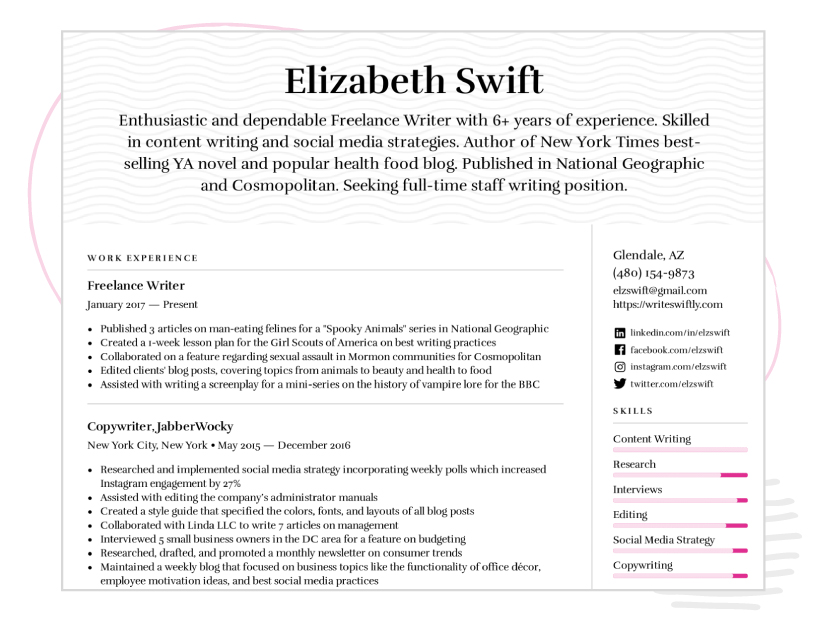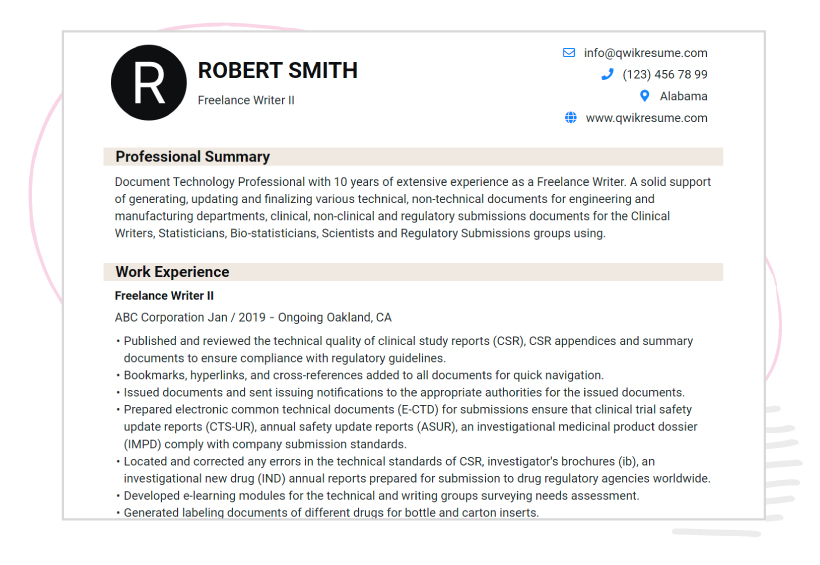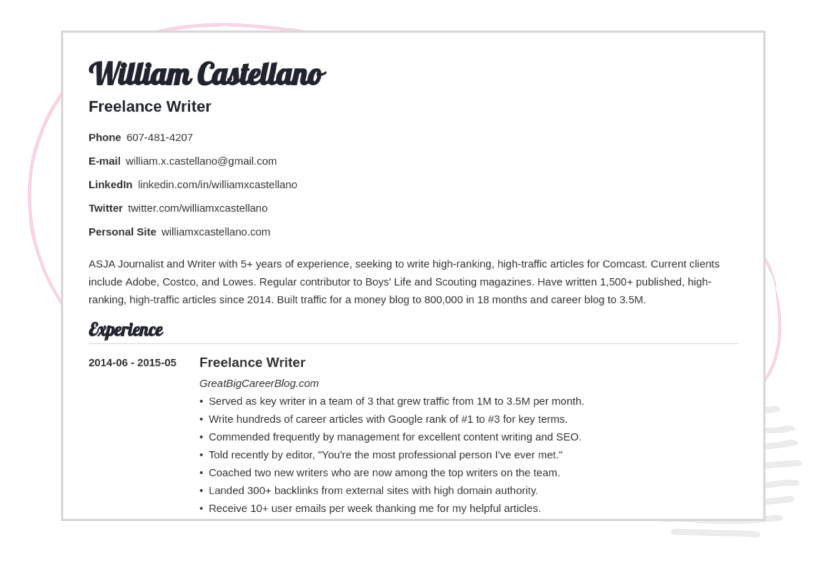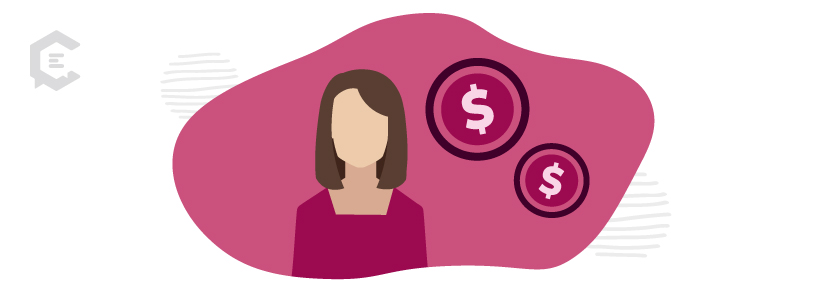A compelling freelance resume is a catalyst to higher rates, better clients, and a fruitful freelancing career.
Unfortunately, not all freelancers have “resume writing” in their skill sets. With over one billion freelancers worldwide, you need every advantage to stand out.
Don’t miss out on golden opportunities to further your freelance business. Use the strategies below to create an eye-popping freelance resume to show your best work and secure better clients.
Does freelance work count as employment?
Freelancing doesn’t count as traditional employment. Freelancers are classified as self-employed, which means they have full control over who they work with, work hours, and rates.
Resume templates typically cater to full-time employment job experiences. Freelancing is important work experience and should definitely be included in your resume. This is especially true if most of your work experience is freelance.
Why should you put freelance work on a resume?
Here are the benefits of including your freelance work experience in your resume:
- Highlight your time management skills. Grinding through years as a professional freelancer—even on the side—exemplifies superior time management. Juggling multiple projects at the same time shows that you can budget and spend your time effectively.
- Show your self-starter side. Freelancing shows potential clients or employers that you’re a self-motivated and self-dependent professional. After all, freelancers are self-starters who seek their own opportunities, market their own brands, and take charge of their own productivity.
- Freelancers get more impressive achievements. Compared to full-time employees, freelancers enjoy more opportunities to take on new challenges, hone their skills, and further their career. Your copywriting skills could be the sole reason for tripling the sales of a reputable retailer—or your work could be featured in an international publication.
- Prove your expertise. Freelancers are often self-taught individuals who didn’t depend on formal education, but that doesn’t invalidate their expertise in their niche. Since you’re wholly responsible for your business results, your work history more than proves your knowledge and capacity to apply what you know.
- Showcase your diverse skill set. Freelancers are often required to wear many hats and handle responsibilities outside the scope of their specialization. For example, a freelance writer also routinely handles tasks related to SEO, social media publishing, fact-checking, email marketing, and content management.
Where do freelance jobs go on a resume?
Freelance work can be included chronologically alongside previous, full-time work experiences in your resume:
Image Source: EasyResume.io
Alternatively, it can be sprinkled over key sections, like your resume summary and skills section:
Image Source: QwikResume.com
You can also mention your past freelancing experiences in your achievements section. Start with a list of your best-published works—be it on your own blog, a client’s website, or an online publication.
Ideally, your resume should also include a link to your online portfolio website, which is a more comprehensive collection of your best freelance works:
Image Source: Zety.com
Your portfolio allows prospective clients and employers to verify your credibility by providing a list of freelance projects under your name. Create a detailed “freelance projects” section that specifies your project’s name, year, and URL (if applicable). To make this section more compelling, highlight the skills, tools, and other resources you used to make each project a success.
How do you put gig work in a resume: 5 quick tips
Ready to create a freelance resume that sparkles?
Follow these five simple tips to create a thumb-stopping resume that will make clients and employers forget about other candidates:
1. Create a detailed resume summary
In addition to your years of experience and freelance specialization, mention your most notable clients, publication channels, and actual results.
Instead of saying “freelance writer with 10+ years of experience helping clients win tons of traffic.” Make it more eye-catching and believable with actual numbers, like “freelance writer with 10+ years of experience, over 3,000 published works, and roughly 5 million in generated traffic for client projects.”
2. Write results-oriented work experiences and achievements
Rather than focusing on the actual tasks and responsibilities, highlight the results you delivered to your previous clients when writing about your experience.
Resume writers tend to create bullet points that explain their roles in former jobs. As a freelancer, spice it up with milestones and impressive numbers, such as:
- Led content marketing campaign that brought 100,000 more website traffic in 3 months.
- Created 50+ articles that ranked for Google’s top 10 search results.
- Submitted 150+ guest posts to relevant, authoritative websites for link building.
3. Specify self-development activities
Exemplify your initiative by highlighting activities you do for lifelong learning and professional development, like conferences, workshops, and courses. It also helps to mention events you attended either as a guest or speaker.
4. Highlight your best projects
Highlight previous freelance projects that best display your industry experience and expertise. If you have a specific employer you want to target, include projects relevant to their space. Feel free to create multiple versions of your resume with various featured projects for each prospect.
5. Prove skills your target prospects are looking for
Lastly, list down the hard and soft skills your target clients and employers look for. More importantly, share examples of past achievements that required you to utilize those skills. Some of the most sought-after skills in freelancers are:
Soft skills:
- Creativity and outside-the-box thinking
- Interpersonal skills
- Time management
- Communication
- Problem-solving
- Positive response to criticism
- Working under pressure
Hard skills:
- Keyword research
- Data analysis
- On-page optimization
- Copywriting
- Proofreading/Editing
- Translation
- Project management
- Graphic design
- Content ideation
- Competitor research
- Specific tools (WordPress, Semrush, MS Office, and Google Workspace)
Consider creating multiple versions of your resume with varying skill sets tailored to each prospect. This is useful if you’re eyeing opportunities in slightly different fields.
Land higher-paying clients through the ClearVoice Talent Network
By joining the ClearVoice Talent network and optimizing your profile, you can improve your CV portfolio’s visibility and attract higher-paying clients.
Prospective clients who need your unique skill sets are out there—create your portfolio and be discovered today.











